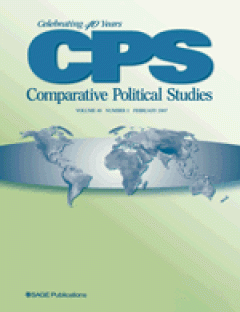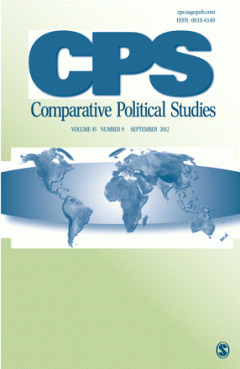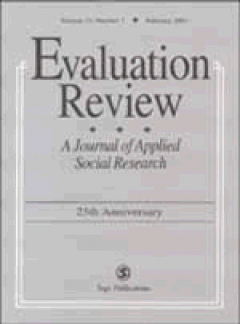Filter by

Interests, Inequality, and Illusion in the Choice for Fair Elections
Why do actors in transitional governments choose to hold fair elections when so many other options are available? The answer to this question is key to understanding an essential element of democracy’s institutional collage. This essay explores the choice of fair elections through the comparison of two episodes in Portuguese history: the elections held at the founding of the First Republic (whi…
- Edition
- Vol. 43 no. 8-9, August 2010, pp. 1119-1147
- ISBN/ISSN
- 00104140
- Collation
- -
- Series Title
- Comparative Political Studies
- Call Number
- -

The Diffusion of Regime Contention in European Democratization, 1830-1940
This article goes beyond the established literature’s focus on domestic conditions by examining the impact of external impulses on European democratization from 1830 to 1940. Specifically, it analyzes the diffusion of regime conflict that arose from the cross-national spread of situational judgments about the feasibility of political change: Striking precedents of regime collapse, such as the o…
- Edition
- Vol. 43 no. 8-9, August 2010, pp. 1148-1176
- ISBN/ISSN
- 00104140
- Collation
- -
- Series Title
- Comparative Political Studies
- Call Number
- -

The Great Reform Act of 1832 and British Democratization
This article focuses on the brief period (1828-1835) of intense political change in the years immediately before and after the Great Reform Act of 1832 as a critical juncture within the process of British democratization. This change was set in motion by a movement to extend the rights of religious minorities, but soon took on a dynamic of its own and led, quite unexpectedly, to a fundamental b…
- Edition
- Vol. 43 no. 8-9, August 2010. pp. 1000-1022
- ISBN/ISSN
- 00104140
- Collation
- -
- Series Title
- Comparative Political Studies
- Call Number
- -

Do Ethnic Parties Exclude Women?
Do parties that represent ethnic minorities tend to exclude women? There are several reasons to think that this may be the case. First, the comparatively smaller size of ethnic parties could exclude women, especially under proportional representation. Second, the subcultures of many ethnic minorities are often more patriarchal than the majority culture, and thus parties representing such groups…
- Edition
- Vol. 43 no. 10 October 2010.pp. 1179-1201
- ISBN/ISSN
- 00104140
- Collation
- -
- Series Title
- Comparative Political Studies
- Call Number
- -

Corruption and Trust: Theoretical Considerations and Evidence From Mexico
The growing empirical literature on political corruption shows trust (interpersonal and political) to be both cause and consequence of corruption: a conclusion that largely builds on studies using cross-national measures of corruption based on perceptions of corruption rather than actual experience, raising questions of endogeneity. The lack of trust fed by corruption is considered critical in …
- Edition
- Vol. 43 no. 10, October 2010.pp. 1258-1285
- ISBN/ISSN
- 00104140
- Collation
- -
- Series Title
- Comparative Political Studies
- Call Number
- -

What You Want Depends on What You Know: Firm Preferences in an Information Age
Information has become a core input for many companies. This article examines how this affects firm policy preferences. In contrast to national typologies of capitalism or microeconomic expectations, it uses information economics and historical institutionalism to construct a deductive model positing two basic logics. Firms with significant information assets view data as a private good, suppor…
- Edition
- Vol. 43 no. 10, October 2010.pp. 1286-1312
- ISBN/ISSN
- 00104140
- Collation
- -
- Series Title
- Comparative Political Studies
- Call Number
- -

Political Competition as an Obstacle to Judicial Independence: Evidence From …
A large literature attributes independent courts to intense political competition. Existing theories, however, have a previously unrecognized boundary condition— they apply only to consolidated democracies. This article proposes a strategic pressure theory of judicial (in)dependence in electoral democracies, which posits that intense political competition magnifies the benefits of subservient c…
- Edition
- Vol. 43 no. 10, October 2010. 1202-1229
- ISBN/ISSN
- 00104140
- Collation
- -
- Series Title
- Comparative Political Studies
- Call Number
- -

Why Get Technical? Corruption and the Politics of Public Service Reform in th…
The emergence of new information and communication technologies in the 1990s offered governments opportunities to deliver public services more effectively to their citizens. Yet national and subnational authorities have employed such technologies in highly uneven ways. Drawing on a new data set of technology policy adoption by Indian states, the author argues that political calculations drive v…
- Edition
- Vol. 43 no. 10 October 2010.pp. 1230-1257
- ISBN/ISSN
- 00104140
- Collation
- -
- Series Title
- Comparative Political Studies
- Call Number
- -

Islam and Large-Scale Political Violence: Is There a Connection?
Are Muslims especially prone to large-scale political violence? From Montesquieu to Samuel Huntington, prominent modern analysts of politics have regarded Muslims as unusually inclined to strife. Many other observers have portrayed Islam as a peace-loving faith and Muslims as largely pacific.Yet scholars still lack much hard evidence on whether a relationship between Islam and political violenc…
- Edition
- Vol. 43 no. 11, November 2010 .pp. 1327-1362
- ISBN/ISSN
- 00104140
- Collation
- -
- Series Title
- Comparative Political Studies
- Call Number
- -

Obstinate and Inefficient: Why Member States Do Not Comply With European Law
This article seeks to explain cross-country variation in noncompliance with European law. Although noncompliance has not significantly increased over time, some European Union member states violate European law more frequently than others.To account for the observed variance, the authors draw on three prominent approaches widely used in the compliance literature— enforcement, management, and le…
- Edition
- Vol. 43 no. 11, November 2010.pp. 1363-1390
- ISBN/ISSN
- 00104140
- Collation
- -
- Series Title
- Comparative Political Studies
- Call Number
- -

Staying Alive: Genetics in the Service of the Welfare “People’s Home”
This article aims to contribute to the ongoing debate over population politics and the perceived reinvigoration of eugenic practices in “people’s home” countries. The ability of governments to subsidize genetic technologies or familial lifestyle choices also gives them the ability to choose who has access to these technologies and in so doing the ability to favor the procreation of one group ov…
- Edition
- Vol. 43 no. 11, November 2010 .pp. 1391-1414
- ISBN/ISSN
- 00104140
- Collation
- -
- Series Title
- Comparative Political Studies
- Call Number
- -

Whos in Charge? Presidents, Assemblies, and the Political Control of Semipres…
This article develops an account of who controls Europe’s semipresidential cabinets politically. The authors ask which actors negotiate cabinet composition and what shapes who is in charge of the cabinet—questions that have been the focus of key debates about the political consequences of this regime type since Duverger. This article proposes and tests a principal—agent account of semipresident…
- Edition
- Vol. 43 no. 11, November 2010.pp. 1415-1441
- ISBN/ISSN
- 00104140
- Collation
- -
- Series Title
- Comparative Political Studies
- Call Number
- -

Modernization, Islam, or Social Capital: What Explains Attitudes Toward Democ…
This article explains the determinants of individual support for democracy in 10 Muslim-majority countries. Starting with economic and cultural interpretations of modernization theory, the author advances an argument exploring cross-linkages between macro- and micro-level implications of this theory as they relate to attitudes toward democracy. The author also provides a test of two alternative…
- Edition
- Vol. 43 no. 11, November 2010.pp. 1442-1470
- ISBN/ISSN
- 00104140
- Collation
- -
- Series Title
- Comparative Political Studies
- Call Number
- -

Does Crime Pay? Issue Ownership, Political Opportunity, and the Populist Righ…
This article contributes to the vast literature concerning extreme right parties in Western Europe by examining the effects of crime on the electoral success of these parties. Utilizing theories of issue ownership and political opportunity, this article argues that populist right parties appeal to voters who feel a sense of physical and social insecurity because of higher levels of crime. This …
- Edition
- Vol. 43 no. 11, November 2010.pp. 1471-1498
- ISBN/ISSN
- 00104140
- Collation
- -
- Series Title
- Comparative Political Studies
- Call Number
- -

Inequality and Democratization: A Contractarian Approach
Scholars continue to grapple with the question of the relationship between economic development and democratization; prominent recent research has focused on the effects of economic inequality. Boix suggests that democratization is likelier when inequality is low, whereas Acemoglu and Robinson argue that democratization is likelier when inequality is at middling levels. Both assume that democra…
- Edition
- Vol. 43 no. 12, December 2010.pp. 1543-1574
- ISBN/ISSN
- 00104140
- Collation
- -
- Series Title
- Comparative Political Studies
- Call Number
- -

Incentives for Personal Votes and Women’s Representation in Legislatures
To explain the gender gap in legislatures, scholars have identified several socio-economic, political, and cultural factors that undermine women’s representation. One explanation focuses on electoral institutions. Proportional representation systems with higher district magnitudes have been shown to increase the percentage of women in legislatures.The authors contend that solely concentrating o…
- Edition
- Vol. 43 no. 12, December 2010.pp. 1575-1600
- ISBN/ISSN
- 00104140
- Collation
- -
- Series Title
- Comparative Political Studies
- Call Number
- -

Perceptions of Electoral Fairness and Voter Turnout
Previous research has established a link between turnout and the extent to which voters are faced with a “meaningful” partisan choice in elections; this study extends the logic of this argument to perceptions of the “meaningfulness” of electoral conduct. It hypothesizes that perceptions of electoral integrity are positively related to turnout. The empirical analysis to test this hypothesis is b…
- Edition
- Vol. 43 no. 12, December 2010.pp. 1601-1622
- ISBN/ISSN
- 00104140
- Collation
- -
- Series Title
- Comparative Political Studies
- Call Number
- -

Cities on Fire: Social Mobilization, State Policy, and Urban Insurgency
Major theories of civil war emphasize the social and military attributes of rural terrain as key causes of conflict. This focus has led scholars to ignore important urban insurgencies in the Middle East and South Asia. This article makes two arguments about the roots of urban insurgency. First, it shows that robust urban social mobilization is possible and common. This can provide a social base…
- Edition
- Vol. 43 no. 12, December 2010. pp. 1623-1649
- ISBN/ISSN
- 00104140
- Collation
- -
- Series Title
- Comparative Political Studies
- Call Number
- -

Citizens’ Perceptions of Government Responsiveness in Africa: Do Electoral …
How do electoral systems influence citizens’ perceptions of government responsiveness? It is well known that although majoritarian electoral systems emphasize the directness and clarity of the connection between voters and policy makers, proportional representation systems facilitate the representation of all factions in society. Although there have been a few studies of the direct influence of…
- Edition
- Vol. 43 no. 12, December 2010. pp. 1650-1674
- ISBN/ISSN
- 00104140
- Collation
- -
- Series Title
- Comparative Political Studies
- Call Number
- -

Gathering Time-Series Data for Evaluating Behavior-Change Campaigns in Develo…
Gathering time-series data of behaviors and psychological variables is important to understand, guide, and evaluate behavior-change campaigns and other change processes. However, repeated measurement can affect the phenomena investigated, particularly frequent face-to-face interviews, which are often the only option in developing countries. This article presents three intervention control studi…
- Edition
- Vol. 34 no. 5, October 2010.pp. 367-390
- ISBN/ISSN
- 0193841x
- Collation
- -
- Series Title
- Evaluation Review
- Call Number
- -
 Computer Science, Information & General Works
Computer Science, Information & General Works  Philosophy & Psychology
Philosophy & Psychology  Religion
Religion  Social Sciences
Social Sciences  Language
Language  Pure Science
Pure Science  Applied Sciences
Applied Sciences  Art & Recreation
Art & Recreation  Literature
Literature  History & Geography
History & Geography